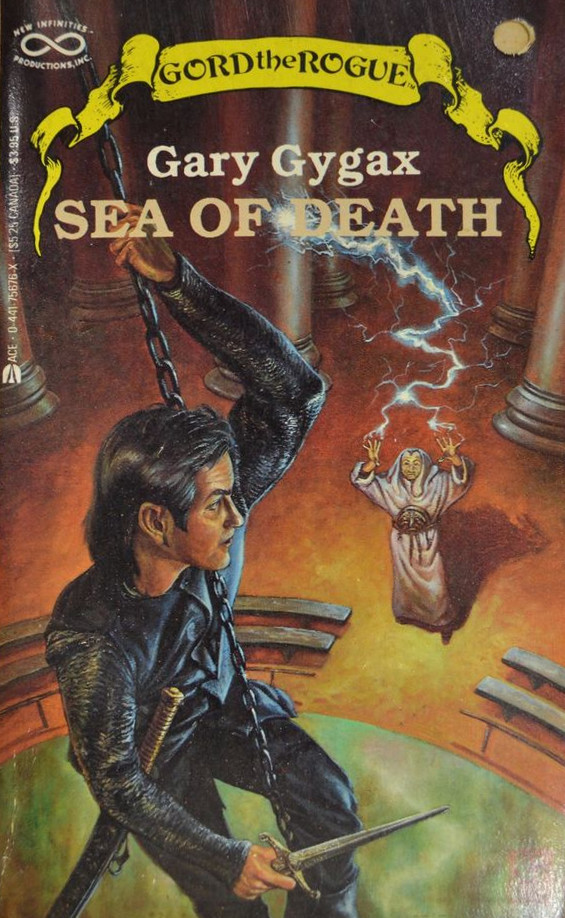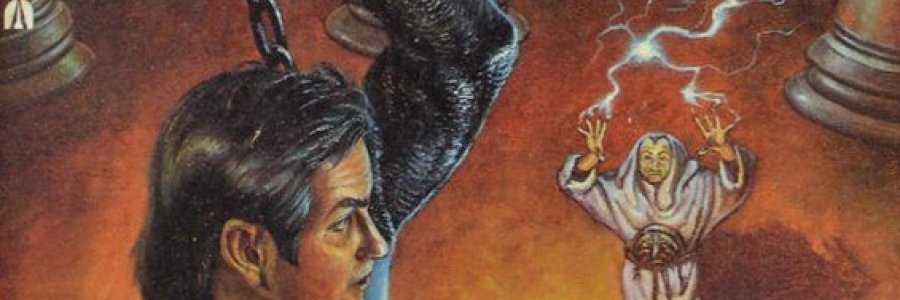
Gary Gygax is best known as the co-creator of Dungeons & Dragons. He also wrote a few fantasy novels, all of which were clearly inspired by his experiences running D&D campaigns. They're even set in his Greyhawk campaign world, including the book I'm reviewing here.
The Sea of Death is a rollicking fantasy action adventure in a D&D-esque world, which includes a few unusual elements that raises it above its formulaic peers.
The setting probably won't amaze you. While the novel starts at a tavern, and frequently checks in on the demonic villains as they argue in weird pocket dimensions, most of the story takes place in a desert with vaguely Middle Eastern cultures: flowing white clothes, scimitars, roving groups of bandits on camel-back, and such. Gygax manages to walk a fine line between using archetypical elements of Middle Eastern cultures without veering into real-world stereotypes. This isn't a commentary on Middle Eastern cultural values, and there's a pleasantly wide array of characters, some opportunistic and some just getting on with their lives.
The plot is pretty standard, but the Maguffin has an interesting twist. A powerful artifact was long ago split in three parts. Possession of any artifact gives the holder tremendous power, while possession of all three will essentially usher in an apocalypse. As such, nobody wants any one faction to possess all three segments; they'd rather give up a segment before that happens.
As such, the various divine and demonic factions vying for this artifact set up a contest, each sending champions for the final piece. The hero is chosen and sent off to find it in an ancient, abandoned complex.
The characters are a bit more interesting, though they don't have too much time to develop given the action-oriented story.
The story focuses on Gord, a young man and a rogue with several strange abilities, including the ability to turn into a panther. That's right. It very much feels like a high-level D&D character thrown into a fantasy story; he has out-of-place abilities that feel like they came from random treasure and magical effect tables.
He falls in with a few different companions over the course of the series, but his primary companion is an amnesiac young woman Gord almost literally stumbles upon as he's escaping from a group of bandits; she's trapped under her dead mount.
Leda is a refreshingly active female sidekick, fully able to hold her own in combat. While she does get herself in trouble occasionally, it's mostly because of her lack of experience in exploration.
That said, I'd be remiss if I didn't mention Gord's often patronizing tone towards Leda, constantly calling her "girl" and chastising her actions. She makes note of this a few times, in fact once deliberately replying by calling Gord "boy," so it does come across as more of a deliberate character flaw on Gord's part than an unconscious sexist attitude in Gygax.
In any event, Gord, Leda, and occasional other compatriots travel across burning sands towards a sunken city, and without getting into spoilers, it ends with a massive confrontation between dozens of combatants in a satisfyingly epic climax. This is important because the novel establishes the stakes as a power grab by several hugely powerful forces, so that sort of big battle pays off.
Gygax's writing style suits the genre well, giving the reader enough detail about elements like clothing and character movement to ground the story in an alternate reality, without getting so lost in description it takes pages to set up each scene. Action is also described with enough detail to keep it feeling fresh and tactical, not just a rote trading of blows until the protagonist wins.
Overall, I thoroughly enjoyed the novel, though it certainly doesn't break any ground in the fantasy genre. But then, it's clearly not supposed to. It's a vacation in an adventurous land.

![[Atom feed]](/user/themes/geek-archaeology/images/atom-feed.png)
![[RSS feed]](/user/themes/geek-archaeology/images/rss-feed.png)
![[iTunes podcast feed]](/user/themes/geek-archaeology/images/itunes-feed.png)